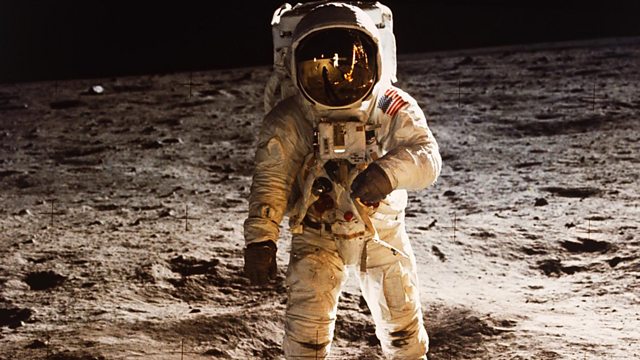Omnibus Edition
50 years after the first moonwalk, we celebrate the genius of Welsh engineers and scientists who helped make it happen, and re-live the build-up to an event that changed the world.
The Moon & Us is a documentary celebrating 50 years since humans first walked on the moon in July 1969. We reveal the Welsh people involved in the success of the Apollo missions and explore the legacy left behind - inspiring generations. It was an event that united people all over the world who had access to TV sets to watch humanity stand, for the first time, on an alien world.
1969 was a remarkable year in many ways, especially in the US. President Nixon came to power; there were huge protests about the war in Vietnam, and Americans soldiers starting to pull out and there was the event that changed the history of rock and roll - Woodstock. The music of that year is instantly recognisable, and the programme gives us a flavour of not just the space highlights but the atmosphere and sounds of that special year.
Taking us on this journey of celebration is presenter Elin Rhys, who watched the moon landing in awe at the age of 12, and who has been a space nut ever since, never believing she would eventually meet some NASA legends. Her guide in Houston Texas is proud Welsh/ Canadian astronaut Dr. Dafydd Rhys Williams, a veteran shuttle astronaut and medical specialist. His father was born and raised in Bargoed in the Rhymney Valley. During his flights on Columbia and Endeavour, he carried out unique research into neurology, built sections of the International Space Station, and carried Welsh memorabilia with him, clocking up over 17 hours of space walks. He was inspired by the bravery, genius and dedication of not only the Apollo astronauts, but the army of engineers and scientists that made it possible.
We hear about the legacy of key engineer, the late Tecwyn Roberts from Anglesey, through interviews given by some mission control legends; Glynn Lunney, and flight director on the Apollo 11 mission itself, Gene Kranz. Recently honoured by the Goddard Space Centre for being a pioneer in communication and creating mission control. But it wasn't just Tecwyn. There could have been no landing without the meticulous maps that astronomers had provided of the moon’s surface, and one Welsh female astronomer, Barbara Middlehurst, born and raised in Penarth, is credited as being one of the most important moon mappers. We hear from Welsh/American George Abbey, who became possibly one of the most influential, and controversial, leaders in NASA’s history. He was working at mission control throughout the Apollo programme, building relationships with the astronauts, but sadly lost three of them when Apollo 1 caught fire on the launch pad. After the days of Apollo, George became responsible for choosing all the Shuttle Astronauts.
On the other side of the world in July 1969 another Welshman, this time from Cockett in Swansea was also holding his breath. His name was Edward ‘Taffy’ Bowen. Already a war hero after he designed air-borne radar enabling us to win the Battle of Britain in World War 2, he transferred his skills into radio astronomy and built an iconic radio telescope in Parkes, Australia. Telescopes in the northern hemisphere would have missed the moon walk, and Parkes telescope, despite a massive storm, ensured we all got to see and hear the moon landing and Armstrong’s first words.
But after that small step – where did the giant leap take us? George Abbey, his mother from Laugharne chose all future astronauts and was key to so many of NASA’s future missions; Apollo- Soyuz, Shuttle, Skylab, and ISS. One astronaut chosen was of course Dr Dafydd Rhys Williams.. He and George appreciate the influence of their Welsh parents. Dafydd takes Elin to the training centre at Houston’s Johnson Space Centre and gets permission to enter the shuttle training mock up. Welsh scientists back home reveal how they were inspired by the Apollo missions. George Abbey, Gene Kranz and Glyn Lunney, are now in their late eighties, but have clear ideas about what the future holds for the young people who aspire to be the next generation of astronauts..
Last on
Broadcasts
- Sun 22 Dec 2019 08:00������̳ Radio Wales
- Christmas Day 2019 19:00������̳ Radio Wales
- New Year's Day 2020 19:00������̳ Radio Wales

